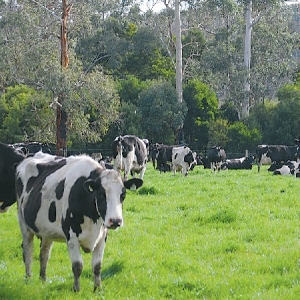A dry spell is followed by rain or a run of moist, overcast days raises the risk level.
"During a severe drought, lack of moisture stops plant roots from absorbing nitrate. When the rain finally arrives, roots suck up nitrate rapidly, with the pasture accumulating high levels in the stem and leaves," says Ballance science manager Aaron Stafford.
"After a drought-ending rain, it could be two weeks before nitrate levels in pasture stabilise at safe levels, provided environmental conditions are favourable. Hail or light frost can also damage plants, affecting photosynthesis and leading to elevated nitrate levels."
Stafford says plants usually absorb soil nitrogen as nitrate and convert most of it into ammonium and amino acids. But weather conditions in late autumn and winter can sometimes interrupt the conversion process, increasing the risk of nitrate poisoning.
All ruminants can be affected. Cattle are the most susceptible, sheep the least and young stock is more vulnerable than old. Nitrate poisoning sets in rapidly after an animal eats pasture or feed with excessive nitrate levels (0.21% or 2,100 parts per million and above is considered 'at risk').
Stafford says rape is known for high nitrate levels, closely followed by other brassicas. Vigorous ryegrass (especially annuals) can create problems, as can cereal green-feeds. Nitrate concentrations are generally higher in new plant growth and decrease with age. Stalks are highest in nitrate content, followed by leaves and then grain.
Notably, young pastures (e.g. those re-sown in the last 1-2 years) generally present greater risk to grazing livestock than older pastures.
"Nitrate poisoning progresses quickly and has no ready cure so prevention is important. Testing pasture and feed for nitrate is one option but there are other ways to mitigate the risk."
Farmers who suspect they have a high nitrate risk can use the following strategies:
• Split nitrogen applications late in the season to distribute nitrogen better. Apply nitrogen after grazing.
• Don't put hungry stock on high-nitrate feeds. Give them a low-nitrate feed first, preferably one that takes a while to digest (such as straw or hay) so they are less likely to gorge themselves on risky pastures.
• Dilute high-nitrate feeds with low-nitrate feeds. This helps microbes in the rumen adapt to high nitrate feeds. Adjustment can take three to four weeks.
• Pasture nitrate levels are highest overnight and in the morning. Where possible constrain stock access to pasture (particularly in the morning grazing) until animals have been supplemented with low nitrate feed. This could involve in-shed feeding, use of feed pads or laneways, or fencing off areas on pasture to feed out supplementary feed and reduce pasture access.
• Minimise stock intake of pasture in the first 1-2 weeks following drought-breaking rain. This requires adequate supplementary feed to cover this most at-risk period.
• Stock lightly, so animals can selectively graze and avoid hard grazing - the lower part of stems have the highest nitrate content.
• Provide a lot of clean drinking water for stock on high nitrate forage.










